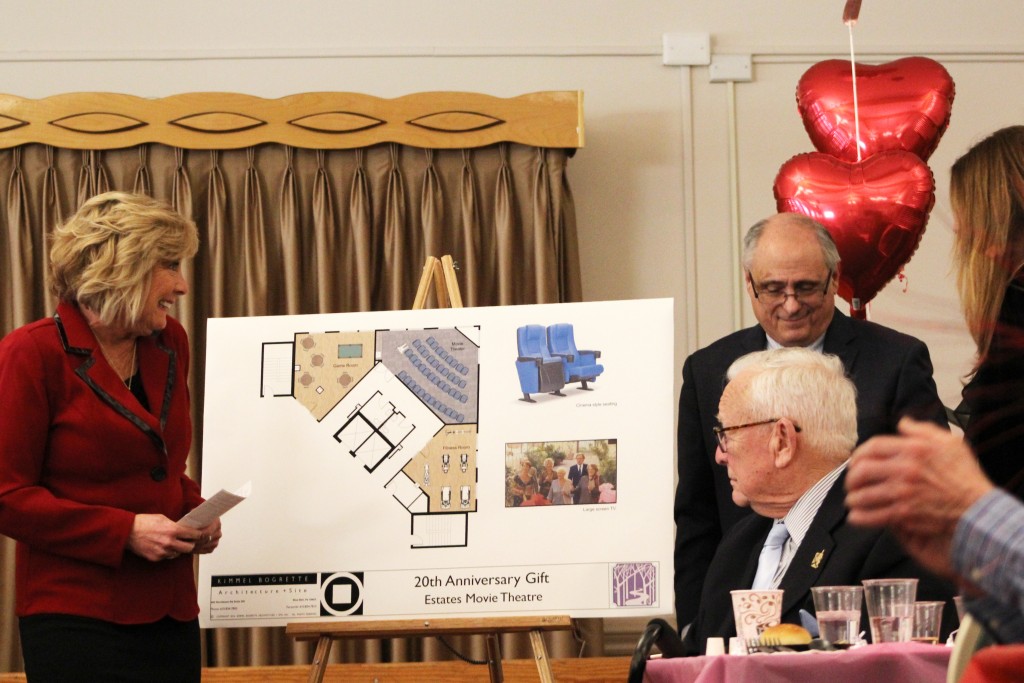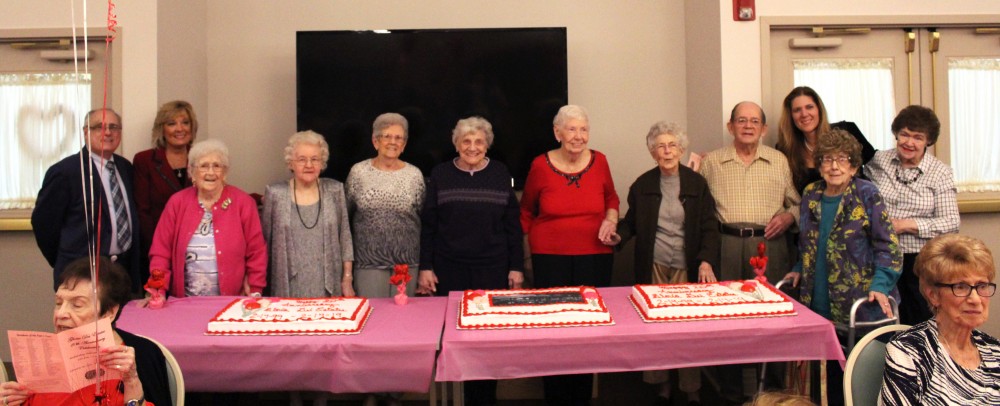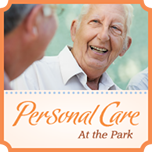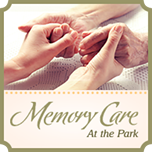On February 13th, 2019, the Gloria Dei Estates community had the honor of celebrating their 20th anniversary. This momentous date called for a momentous event! All of the residents were invited to enjoy a night of food, drinks, and entertainment.
Before dinner, residents had the pleasure of hearing the history and the origin of this community’s creation from guest speakers such as: Frank Johnson, former Board President; Vincent Dattilo, CEO of Gloria Dei; Susan Wright, President of Gloria Dei; and concluded by Sister Paula Napoli. However, there was also a bit of a surprise built into Susan Wright’s speech.In keeping up with the theme of celebration, she wanted to celebrate twenty years of a wonderful history at the Estates, so helped by Vince Dattilo, they unveiled plans for a brand new theater room at the community! It’s a fitting gift for such an incredible group of people.
Sister Napoli concluded the speech portion of the night by delivering a beautiful firsthand account of her mother’s experience at the Estates. Her mother was fortunate enough to be one of the first members at this community. To read the speech in its entirety, you can view it below.
 As stated previously, Sr. Napoli’s mother was one of the first residents to move into the Estates and was beloved by all, especially for her beautiful piano playing. Sr. Napoli thanked everyone who was involved in her mother’s life at the Estates and gave a special thanks to those who encouraged her to make a CD of her piano playing, the first she has ever done. It just goes to show you the types of communities Gloria Dei curates. They embrace the idea of, “It’s never too late to try something new.”
As stated previously, Sr. Napoli’s mother was one of the first residents to move into the Estates and was beloved by all, especially for her beautiful piano playing. Sr. Napoli thanked everyone who was involved in her mother’s life at the Estates and gave a special thanks to those who encouraged her to make a CD of her piano playing, the first she has ever done. It just goes to show you the types of communities Gloria Dei curates. They embrace the idea of, “It’s never too late to try something new.”
She also spoke of her celebration for her Golden Jubilee. What she had expected to be a small gathering of people in the Grand Room, turned out to be a full blown surprise party at the Red Rooster. They filled it to capacity. It’s just one more example of how you’re not just a resident or the daughter of a resident at the Estates. There’s one word for everybody: family. At the conclusion of her speech, dinner began.
Ensuing dinner there was another celebration to be had. Twenty years ago, the Estates opened. However, the Estates is all about its residents! Especially those who have been here for the entire twenty years! Those individuals had to be honored, which is why they were given the opportunity to participate in the cake cutting ceremony. These incredible people are the reason for the continued success of Gloria Dei Estates.
They are: Jeanne Ballay, Mary Jane Brough, Gertrude Clauhs, Doris Fallon, Agnes Fanelli, Peg France, Florence Goulding, Bernie Lindline, Helen Maclain, Kathleen McHale, Dan Rofrano, Philomena Savoca, and Kathleen Springer.
Once dessert was finished up, it was time for the entertainment. Those in attendance had the pleasure of watching and hearing Lou Dottoli sing the night away. He crooned to the tunes of the greats like Frank Sinatra and Dean Martin and even interacted with the residents. A true performer he was! Needless to say, a good time was had by all. To check out more photos from the event, head to our photo gallery here!
We’d also like to thank everyone who was involved in the event. Without each and every moving part working together, it would have never been such a success. And a special thanks goes out to the residents for their participation! None of this is possible without all of you. Thanks again!
Having a life full of loving family members and caring friends is a blessing for most of us, especially as we age. Constant socializing is the best way to prevent depression, loneliness, and other mental health issues. In fact, studies show that socialization even has a positive effect on our cognitive abilities, helping to lower our risk of Alzheimer’s disease and other forms of dementia.
However, what can you or a loved one do if they happen to live far from family? Or they don’t have access to transportation to see their friends? Luckily, there are options out there to help you or a loved one remain social! Read more about them below:
Volunteering
Giving back to the community not only creates a sense of pride among seniors, it’s also a great way to meet new people and make positive changes. A few of the most common volunteer opportunities for older adults are:
- Working for local literacy programs to help children improve reading levels
- Joining foster grandparent programs and serving as a source of inspiration for at-risk youth
- Helping in the local soup kitchen
- Donating or working at community thrift shops
Of course, there are plenty of other choice out there to help serve your community and make some friends in the process. As stated before, it provides you or a loved one with a wonderful sense of purpose and helps you get in a room with a bunch of your like-minded peers. So try it out sometime!
Continuing Education
Studies show again and again that an active mind is more often a happy mind — and a mind less susceptible to age-related loss of cognitive ability. If you’re looking for new social outlets and the means to better yourself, there are a number of educational opportunities available that can reward you with new friends, new community contacts and new knowledge.
There are lots of adult continuing education opportunities available, many of them free of charge — so if you always wanted to know more about nutrition or learn Portuguese, now’s a good time to do it. There are continuing education programs available for homebound seniors, too, through the aid of other seniors who attend classes on site and later share what they’ve learned.
Gaming
Whether it’s on a golf course or in someone’s living room, there are numerous opportunities to play various games with some folks who are interested in the same ones you are. They don’t have to be as physical as signing up for your local flag football team either. There are clubs for fans of crossword puzzles, Sudoku, and jigsaw puzzles. And even virtual sports such as Wii bowling or golfing. They get you up and moving, working through the motions to get your blood pumping, and focusing on form, as opposed to sweating through 18 holes of golf or ten frames of bowling. You get to play the sports you love, but on your own time.
That’s not to say more physical sports clubs don’t exist for people over 50. There are plenty of leagues out there like softball, tennis, and Frisbee golf. Of course, make sure you consult with your primary physician before doing anything too active. It’s always best to make sure you’re in proper health before attempting to play a 7 set match of tennis or carrying around your golf bag for 18 holes in the heat of the summer.
Pursuing Hobbies
Post-retirement, most seniors have a lot of free time. Why not spend it by taking up a new hobby or diving back into a previously enjoyed activity? Thousands of older adults spend their time scrapbooking, painting, or pursuing photography. Why not you?
There are numerous studies out there that show the many positive side effects of pursuing an artistic hobby. For instance, it helps connect new neurons in the brain, so the chances of cognitive decline for you or a loved one decrease. Plus, much like volunteering, it gives us a sense of purpose. It feels great to finally finish that poem you’ve been working on or to see that empty canvass finally filled. So don’t forget! There is no age limit when it comes to trying new things or picking up something right where you left off! Join a painting class or a scrapbooking club. Find some new friends, after all it’s good for you!
Oral health is an important, yet often overlooked component of a senior’s health and well-being. People tend to view their teeth and gums as something that’s supposed to deteriorate as you age. This is not the case. You only have one set of adult teeth. It’s best to take care of them by brushing and flossing every day. Not to mention, oral infections have the potential to spread to other parts of the body. Dental hygiene is extremely important at any age. Unfortunately, seniors face a unique set of dental issues. Below details some of the oral complications that are unique to seniors:
Gum Disease
Many older adults are affected by gum disease or periodontal disease. Why’s that? It’s due to the early stages of the disease. It’s practically a painless condition until it becomes more advanced. In the early stages, you may notice that your gums are a little swollen, and they may bleed a little more when you’re brushing them. However, that’s not enough to alarm some people, so the disease progresses.
The gums can then pull away from the teeth and form deep pockets. This provides a greater area for food to get stuck in, more plaque to develop, and bacteria to spread rapidly. This can eventually lead to a loss of gums, bone, and ligaments that hold the teeth in place. That’s why it’s important for your loved one to keep up with their bi-annual checkups. Making sure they get to the dentist is enough to ensure the advanced stages of gum disease are never reached, on top of brushing twice a day and flossing at least once, of course.
Eating Difficulties
Oral damage above or below the gum line can make it nearly impossible for seniors to eat. Their lack of appetite might not just be a condition that comes on from aging. They could have oral issues. With problems like missing teeth, ill-fitting dentures, or troublesome bridges, eating difficulties can force seniors to modify their chewing habits. Again, make sure you’re monitoring their eating habits. It’s true that seniors do not eat as much as middle aged or teenaged individuals. However, it could also be due to any of the oral issues listed above.
Dry Mouth
Bouts of dry mouth called xerostomia are common among seniors, but just like cognitive decline or falls, should not be a normal part of aging. Saliva plays a crucial role in the eating and digestion process. It helps your senior loved one with chewing, eating, and swallowing. It’s also a major issue when it comes to eating difficulties.
However, saliva is also crucial in preventing tooth decay. Without the normal amount, your mouth has a lesser chance in preventing a bacterial infection and, in turn, cavities. Many seniors take daily medications to treat or manage illness. Unfortunately, a number of those medications cause dry mouth. Examples include decongestants, antihistamines, and blood pressure medications. These are all very common medications to control some very common conditions. We do not suggest in stopping with these medications. However, you will need to ensure that your senior loved one is drinking enough water from day to day. This will help with the dryness and help maintain saliva production to fight the bacteria in your loved one’s mouth.
[ipanorama id=”4424″ width=”100%” height=”640px”]
The New Year is a time to adjust and reshape some things in your life. We all have some areas that need to be improved, whether it’s our diet or our outlook on life. There are countless aspects to our lives, and it’s impossible to assume we have nothing to improve from any kind of resolution. However, you may still need a little help coming up with some resolutions that can lead to a healthier lifestyle. Below you can find 5 New Year’s resolutions that can help you live a better life.
Agree to Quit Smoking
It’s a nasty habit that contributes to heart disease and lung diseases such as emphysema and Chronic Obstructive Pulmonary Disease (COPD). Of course, most smokers already know the damage it causes but are reluctant to quit in their old age. People believe that a lifetime of smoking cannot be reversed. But they’re wrong. It’s never too late to quit. Your body still has the ability to heal itself. By quitting now, you’re still giving yourself the opportunity to breath better, reduce your risk of heart disease, increase your energy, and sleep better through the night. Those are some pretty good health benefits from only cutting out one bad habit from your life.
Get More Exercise
It can be quite intimidating to start a workout routine. There are so many exercises to be done, and you’re never quite sure if you’re doing it correctly. However, don’t let that discourage you. Much like quitting smoking, it’s never too late to start working out. Do just a little bit of research, at first, to get your main exercises down and do those for a few weeks. That will help build this routine into a habit. Suddenly, you’ll find yourself saying, “I’m going to the gym,” instead of saying, “I HAVE to go to the gym,” implying that you’re going against your own will. You won’t look upon it as a chore and see it as another aspect to your day. The hardest part about doing any exercise is just convincing yourself to do it.
Don’t Forget to Exercise Your Brain
While you’re getting yourself back into shape, it’s also important to realize your brain needs exercise, too. The mind and body are pretty dependent on each other. You can’t have one without the other, so make sure each is getting a healthy balance of exercise. Of course, in order to exercise your brain, it’s a much different workout routine than trying to work out your muscles. Your brain can’t do sit-ups. However, in order to strengthen it, your means of “exercise” can be seen as more amusing than sit-ups.
Games like crossword puzzles, Sudoku, or even a rousing game of Trivial Pursuit with friends can help get the blood flowing to your grey matter. Joining a book club is another good idea, as reading is a great help in keeping your mind fresh. Just like your muscles, in order to keep your brain in shape, you have to use it.
Visit Your Doctor More
It’s not a good idea to ONLY see your doctor when you’re feeling sick. The best way to cure anything is to prevent it from ever happening. It’s like the saying, “the best defense is a good offense,” and if you stay on the offensive about your health, you’ll have many, many successful years ahead of you. That’s why you should strive to see your doctor via scheduled checkups, instead of seeing him or her only when you’re sick.
Sleep Better
There’s a strange myth floating around that states older adults need less sleep than younger people. This is, of course, totally false. We all need around 7 to 8 hours of sleep a night. Without it, we can never feel fully rested. And if you don’t feel fully rested, you’ll never feel like doing tips 1 through 4. That’s why getting better sleep is on this list. It really is important to our everyday lives. The best way to a productive morning is by getting 8 hours of sleep beforehand. And a productive morning leads to a productive day. And a productive day leads to good, healthy sleep. It’s an endless cycle of healthy living, because it goes without saying that it’s much easier to fall asleep at night when you’re slightly exhausted and fully satisfied with how constructive your day was.
Memory Care facilities and Personal Care facilities are becoming increasingly important senior care options for older adults that require long term care. As comforting as it may seem to age in your own home, it simply may not be possible for safety reasons. It’s tough to imagine a parent or loved one, living with some form of disability or chronic illness, accomplishing such a feat without any setbacks. As a result, specialized senior care communities like Memory Care and Personal Care units have been growing quickly in popularity. However, do you know the difference between the two types of communities. Continue reading below to learn more.
Personal Care
When you hear the term “personal care,” you might think of an assisted living facility. And the two are very similar. However, Personal Care units have even more comforting amenities to provide you that peace of mind that your loved one is safe and well taken care of. For most Personal Care units, you can expect to have all utilities included. One monthly bill is much easier to deal with than a flurry of charges every month. It’s another reason why living at home can be so difficult. Not to mention, in some Personal Care units, you can also expect licensed nurses on-duty 24 hours a day. Again, this helps grant you peace of mind knowing that your loved one can receive immediate medical attention if an emergency were to occur.
It should also be expected for Personal Care units to have a full list of activities and programs with outings and various forms of entertainment. This helps your loved one enjoy all the fun things the local area and the community itself has to offer, without having to worry about the burdens of everyday life. This is due to the fact that Personal Care units also provide daily housekeeping, laundry, and healthy meals for its residences. On top of that, you may also find that they provide physician visits, occupational and speech therapy services, optometry services, audiologist and podiatry services, and mobile dental units. These types of communities truly provide everything your loved one needs to remain safe and healthy, as well as entertained and enjoying life again!
Memory Care
Memory Care units are highly specialized facilities designed and staffed to care for individuals suffering from dementia and Alzheimer’s disease. Most communities like to have large, open, and clutter-free environments. This helps dementia patients and their moods, as open environments tend to make us more peaceful. At Memory Care at the Park, we have designed each residence to feature a large window. This helps with light control, so your loved one can receive that wonderful morning sunlight exposure, which in turn promotes healthy sleep patterns.
The biggest difference between these communities lies in the level of care your loved one will receive. Both do include medical professionals on duty. However, at Memory Care units, the people on staff are usually Certified Dementia Care Practitioners. This is a great help, as the needs with those who have memory impairment issues can be much different than those who need personal assistance getting out of bed in the morning or trying to take a shower in the evening. Again, this is all to help you with your peace of mind, moving a loved one out of their home that they’ve probably lived in for the majority of their life.
Explore the Gloria Dei Communities
It’s a difficult decision to make, but if you compare the pros and the cons with each style of living, you’ll find that the level of care and compassion your loved one will receive at one of these communities is second to none. So, if your loved one is experiencing difficulties from memory related issues due to dementia or is struggling with the burdens of everyday life, we encourage you explore Memory Care and Personal Care at the Park. All residences are designed for the utmost levels of resident dignity, privacy, and respect. But don’t take our word for it. Find out for yourself by taking a free tour!
For years, scientists and researchers have been attempting to discover a miracle cure that will prevent or reverse the effects of dementia or Alzheimer’s disease. So far, there has been no such luck. However, there have been minor breakthroughs when dealing with treatments for these neurodegenerative diseases. No cure all, but symptoms have been able to be better managed.
Often times when we’re looking for this miracle treatment, we’ll look for a pill or a shot to be the answer for our ailments. Very rarely do we think about taking a more natural approach to our health issues. That being said, for those who have Alzheimer’s disease or another form of dementia, these holistic approaches are becoming more and more popular. Art, such as drawing/painting or listening to music are becoming quite popular, as more and more studies are concluding that they can play an important role in the treatment of dementia and Alzheimer’s disease.
Read more about the benefits of art therapy for dementia patients below:
Art
Painting and drawing can teach your loved one a nice lesson is free-form art. It allows your loved one to fully express themselves, something that comes with much difficulty if they’re suffering from dementia or Alzheimer’s disease. The colors they choose and the shapes they create can help align with the mood they’re in. More importantly it helps them, even if for a brief moment, feel more in control of their life.
It’s no secret that a loved one will begin to lose their independence after being diagnosed with Alzheimer’s disease or some other form of dementia, especially as the disease begins to progress. Naturally this causes an increase of anxiety in an individual. But with the opportunity to be totally in control over what they’re creating, coupled with the brain stimulation that comes from deciding on what to create, art therapy greatly reduces this anxiety and improves peoples’ moods. It’s a powerful therapy for anyone who is suffering from any form of dementia.
Music
Have you ever heard a specific song that has a very specific memory attached to it? That’s the power of music. It has the ability to attach various memories to various melodies. Not to mention, it requires very little cognitive input to engage with music. Tapping your toe to a beat or humming along to a song can be done when from the time you were one, all the way up until you’re ninety-years-old. Again, it’s another way to reduce the anxiety that builds up in a patient with some form of dementia.
As stated previously, those with a cognitive impairment lose some of their independence. This can also lead to a feeling of loneliness or feeling apart from a group or even their own family. These types of feelings can greatly reduce anyone’s mood. However, with music, a loved one can feel like they belong, because activities such as singing and dancing to a beat do not require as much brain power than playing a card or board game. It’s a powerful tool of inclusion that can be utilized anywhere at any time.
Try it Out!
These two forms of art therapy can be done anywhere! When it comes to drawing or painting, all you need are a few art supplies like a blank canvas or an empty sketchbook, a set of crayons or paints, and a set of paintbrushes. Once you’ve helped decide what kind of medium you’re going for, you’re ready to go! You and your loved one are ready to create.
For music therapy, all you need is a set of speakers and some kind of portable music device like your smart phone or iPod to begin listening. If you really want to get into, maybe pick up a record player for your loved one. That way, if they happen to still have their old records, you can play them, too. It’s just one more way to help them walk down memory lane!
As the population ages in the US and we watch more and more of the baby boomer generation retire, our country will continue to see a rise in the need for at home care. However, an increasingly popular option has become personal care. Previously, personal care has had an unwanted stigma attached to it. But now we’re starting to see what a positive influence continued care in a community environment can do for an individual. If a loved one is having a hard time managing the chores of owning a home or burdened by the activities of everyday life, you might be surprised what a relief it can be for them to move into a personal care community. Here are 5 of the top benefits your loved one can receive from moving into a personal care community.
1. Access to Physical Activities
There’s never a wrong time to continue moving. It’s important to remain active for the duration of your life. Of course, you can’t remain as active in your 60’s and 70’s compared to when you were in your teens and 20’s. But that doesn’t mean you shouldn’t do anything at all. Research continues to find more and more evidence that exercise is important at every stage of your life.
Unfortunately, if a loved one is isolated in their own home without access to transportation, that makes physical activity nearly impossible. Sure, there are activities you can do at home, but once again, being isolated hurts when it comes to motivation. It makes it much easier when you’re with a group than exercising by yourself. Luckily at Personal Care at the Park, this is exactly what you get! Group exercises occur regularly every day and there doesn’t need to be much travel involved! It’s right in your own home.
2. Promotes More Social Interactions
Another important aspect of growing older is remaining socially active. It’s just as important as remaining physically active! Being social promotes mental health, as it staves off depression and other mental health illnesses. That’s the beauty of living in a community. Your loved one will always be surrounded by individuals who care about them. They’ll also have plenty of opportunities to talk to and meet new friends. This is from the many activities and outings planned throughout the year or even from their own ambitions to get out there and meet new people!
3. Safer Living Environment
As your loved one ages in their own home, certain things become a bit of a safety hazard. The burdens of everyday life can become too much. This includes activities such as walking up and down stairs, entering and exiting the shower, or just trying to get dressed every day. Plus, if an emergency happened to occur, your loved one may be incapacitated and be unable to dial 911 or alert a neighbor for assistance. However, at Personal Care at the Park, we have a licensed nurse on duty 24 hours a day. We also have plenty of caregivers ready to lend a hand. This grants your loved one the peace of to live each day care free and helps you rest easy at night knowing your loved one is in good hands!
4. Prepared Meals
A big issue as we age is our nutrition. For starters, it’s a big hassle to cook for yourself every night. As a result, your loved one may order takeout food every night or opt for the easy microwavable meal, instead of fixing their own nutritious meal, which tends to be more nutritious for oneself. Not to mention, our taste buds change as we age. So the same foods we used to love might not be as delicious. This can cause your loved one to eat less. These two scenarios are a major reason why senior malnutrition is quite common. Luckily at communities such as Personal Care at the Park, all meals are prepared ahead of time. There’s no need for your loved one to worry about where the next meal is coming from. Plus, each meal is prepared with nutrition in mind!
5. Zero Home Maintenance
It’s a telling sign that your loved one may need to move to personal care community if you notice their house is becoming cluttered. Again, the burdens of everyday life do not just come from cooking and bathing but from home maintenance as well. This can be quite troublesome, especially if your loved one is still living in the house where you and your family grew up. They can still be living in a three or four-bedroom house, trying to take care of it the best they can. However, what they should be doing is downsizing and moving to a community where they no longer have to worry about such chores. At personal care communities, your loved one is not responsible for upkeep or housekeeping. The only thing they’re responsible for is to make sure they’re having a good time!
The Future is within the Community
As the stigma surrounding personal care communities begins to lessen and lessen, more and more families will begin to realize what a positive effect communities such as Personal Care at the Park have on their loved one’s lives. From fewer chores, to better nutrition, and happier social lives, there’s not much to dislike about community living. If you or someone you love would like to explore this option, we encourage you to sign up for a free tour of Personal Care at the Park by clicking the link here. Don’t just read about the 5 best benefits. Experience them!














